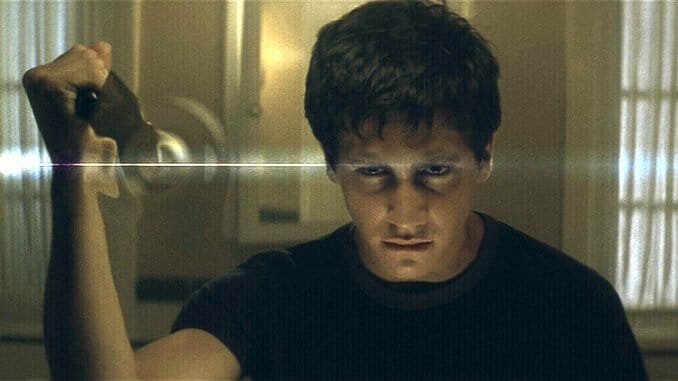Donnie Darko Is Still Weird 20 Years Later, and That’s Still a Compliment

Donnie Darko has been one of my favorite movies since I was 13 years old, which is a pretty inappropriate movie for a middle schooler to claim as their favorite. The first time I watched it, I was huddled with my older sister in our shared bedroom not quite understanding the themes or how questionably some of the female characters had been written. But we loved it. What I think hooked us was the film looking like the original Instagram filter, the infectious piano/synth score by Michael Andrews and Jake Gyllenhaal’s brooding face—a face I’d search for in many of my ex-boyfriends in my early 20s. Who doesn’t love a hot psychopath at some point? Don’t answer that. This past fall, I finally rewatched Donnie Darko—ahead of the 20th anniversary of its premiere at Sundance this January—with my fiancé (not a psychopath), as I had been raving about it for the duration of our relationship…which of course made him never want to watch it. But I had finally worn him down. I was giddy and loud as I repeatedly told him all the things he’d love about it. Mainly that Jake Gyllenhaal was in it.
As the film began, memories of my childhood rushed back to me. I smiled and then got sad, also known as a typical Saturday night for everyone in 2020. But I fought through it and started doing the whole check-in, “Did you see that?” thing people do when they watch a movie with someone who has never seen the movie in question. My fiancé loves that about me, and by “loves,” I mean he refuses to make eye contact until the end credits roll.
I cried at all the usual moments. I know what you are thinking: How many moments are there to cry during Donnie Darko? It was mainly the end montage when we see all the characters, good and bad (mostly bad), have a sudden flash of deja vu, accompanied by the haunting rendition of “Mad World” by Gary Jules and Michael Andrews. I’m a sucker for emotionally vague moments in films that make me go, “Wait, should I be crying or disturbed?” I always end up crying.
As the credits began rolling, I turned to my fiancé and asked him what he thought of it. He sighed a bit and I knew I was going to be annoyed by what he was going to say next. So I beat him to it.
“Why didn’t you like it?” I asked, attempting to withhold a pout. I lie. I pouted openly and freely.
He sighed again.
“I’m just over white dudes writing white stories that I know you could write.”
“Um, I would never write Donnie Darko,” I scoffed. This was already a ridiculous fight.
“I know,” he replied. “It’s just like, I can’t admire a white dude who lucked out on his first script and got all this attention. I mean, he was 23. You’re just as good or better.”
I laugh, because I’m not good at taking compliments. But I’d never thought about it like that before. It’s true. Richard Kelly’s first script was Donnie Darko, and his whole thing was that he shot it in 28 days—the same number of days that count down to Donnie’s death in the film. Which, to be fair, is kinda awesome and irritating at the same time. I’m not bitter at Kelly, just a little peeved. How is it he was able to have such a specific timeline for finishing a project? How was it that a draft of his first script managed to have all the ingredients he needed to tell this story with a beginning, middle and end? Did he even know what he was writing? What was his pitch like?
“So, this movie is about—just wait, this will blow your mind—wormholes AND a giant bunny. Also there are super hot chicks and a teenage boy who has never taken a shower.”
-

-

-

-

-

-

-

-

-

-

-

-

-

-

-

-

-

-

-

-

-

-

-

-

-

-

-

-

-

-

-

-

-

-

-

-

-

-

-

-








































